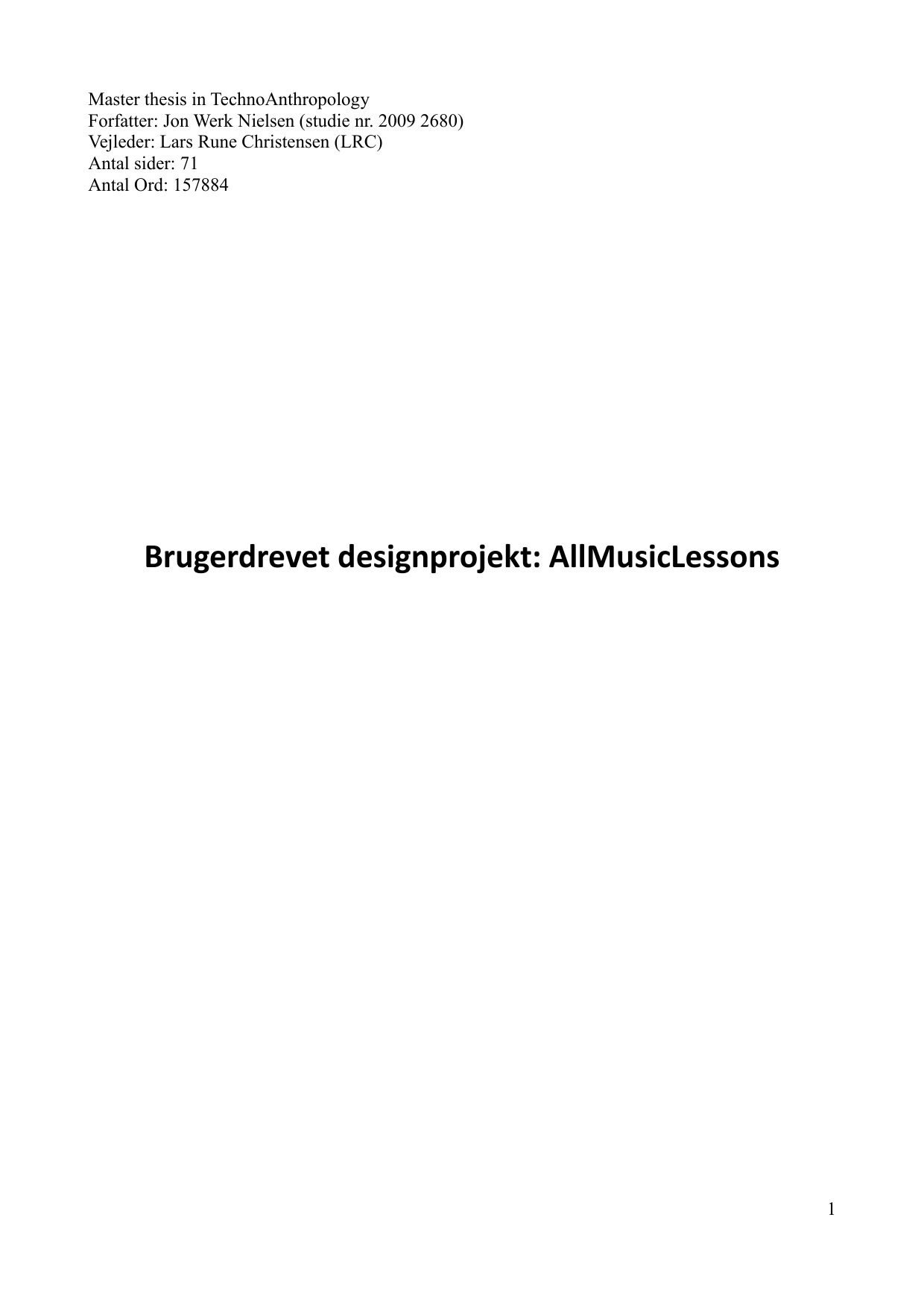
Brugerdrevet design: AllMusicLessons
Oversat titel
Participatory design: AllMusicLessons
Forfatter
Semester
4. semester
Uddannelse
Udgivelsesår
2014
Afleveret
2014-06-06
Antal sider
71
Abstract
Dette speciale har det formål at anvende en brugerdrevet designtilgang til at undersøge en ny facilitering af musikundervisning. Projektet designer en hjemmeside som giver et nemt overblik over alt udbud i lokalområdet, både offentlige skoler, private skoler, kurser og privatundervisere. Platformen forsøger i forlængelse heraf at skabe en bedre matchmaking af lærer og elev. Den indeværende designopgave organiseres gennem en brugerdrevet designmodel med tre faser (fig. 1). I den første fase (erkendelsesværktøj) inddrages beslægtet arbejde, teoretisk forudsætning og feltarbejde til at danne ramme omkring samfundsmæssige forudsætninger, herunder processer og mekanismer som i stigende grad medieres gennem digitale medier. I fasen beskrives transformering af lokalområdet mod et mere flydende sted og fremkomsten af nye markedsmuligheder som omgår mellemmanden og facilitere kontakt peer-to-peer (deleøkonomi). Ud fra ovenstående udledes en ny triadisk relation til at imødekomme de samfundsmæssige forudsætninger og understøtte en mere flydende facilitering af musikundervisning. Denne triadisk relation bevæges fra en statisk relation mellem lærer, facilitator og elev mod en mere flydende relation mellem underviser, facilitatering og den underviste. I den anden fase (designværktøj) inddrages brugere, konkurrenter og eksperter til at konceptualisere vigtigt indhold til designet. Brugerne inddrages gennem samskabelse (co-design) i en workshop, konkurrenterne inddrages ved beskrivelse af primære aktører på marked og eksperter inddrages til at verificere designets realistiske potentiale; gennem anden fase skitseres designløsninger som afgrænses og opsamles i designparametre for at danne bro mellem etnografi (fase 1) og design (fase 2). Designparametrene er henholdsvis: Nemmere overblik over alt musikundervisning i lokalområdet, og bedre matchmaking af underviser og underviste. De to designparametre anvendes som fundament for fase 3 som samler den samfundsmæssige ramme (fase 1) og designparametre (fase 2) i designkonceptet AllMusicLessons (fase 3). Designkonceptet ekspliciteres gennem en prototype af hjemmesiden (http://jwerki.wix.com/allmusiclessons) og til sidst positioneres 2 personas til at illustrere den teknologisk innovation på brugernes præmisser. Nøgleord: Brugerdrevet Innovation, Etnografi, Future Workshop, Ikke-sted, Musikundervisning, peer-to-peer markedsplads, Personas.
The purpose of this thesis is to apply Participatory Design to investigate the facilitation of music lessons. The thesis will build (design) a website, which will afford an easy overview of all the music lessons available in the local area. This includes private and public music schools, courses as well as teachers offering private lessons. This platform will in this respect, be able to certain a better match making of the teacher and pupil. The current design assignment is organized through a Participatory Design model with 3 phases (figure 1). In the first phase (recognition tool), I will be integrating related work, a theoretical foundation and field work to create a structure for the social condition, including processes and mechanisms, which in an increasing degree, are mediated through digital media. In this phase is a description of the transforming of the local area towards a more liquid space and the appearance of new market possibilities, circumventing the middle man, and facilitating contact peer-to-peer (Collaborative Consumption). From the above, at new triadic relationship is deduced, in order to meet the social conditions and support a more fluid facilitation of the market for music lessons. This triadic relationship shifts from a static relationship between teacher, facilitator and pupil, towards a more fluid relationship between the lecturer, the facilitation, and the learner. In the second phase (design tool) the consumer, the competition and the experts are drawn in, to conceptualize significant content of the design. Consumers are involved through co-design in a futureworkshop, the competition is drawn in by describing primary actors on the market and the experts drawn in to verify the realistic potential of the design. Throughout the second phase, design solutions will be outlined, defined and gathered in parameters for design, bridging the gap between ethnography (phase 1) and design (phase 2). These design parameters are: A simpler overview of all available music lessons in the local area and a better matchmaking of the teacher and the pupil. These two design parameters will be applied as foundation for phase 3, compiling the social framework (phase 1) and design parameters (phase 2) into the design concept AllMusicLessons (phase 3). This design concept is explicitly defined through a proto-type of the website (http://jwerki.wix.com/allmusiclessons). In conclusion, two Personas are positioned to illustrate the technological innovation as seen from the premise of the consumer Keywords: Participatory Design, Ethnography, Future Workshop, Non-place, Music lessons, peer-to-peer marketplace, Personas.
